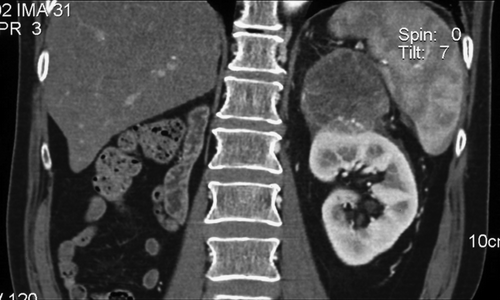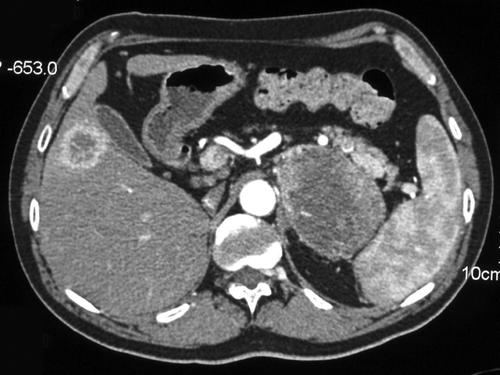To the Editor
Addisonian crisis in patients with metastasized cancer is rare but might be underestimated since its aspecific symptoms occur frequently in cancer patients. History is often aspecific and can include complaints of weakness, nausea, vomiting, abdominal pain, diarrhoea and postural dizziness. At physical examination hypotension, fever and typical hyperpigmentation of scars, skin and mucosa can be found. Routine laboratory tests can show hyponatriaemia, hyperkaliaemia, hypercalcaemia, hypoglycaemia and eosinophilia.
Most malignancies can cause adrenal metastases, of which lung and stomach are well known. Concomitant adrenal insufficiency occurs if more than 90% of the adrenal glands are non-functional and is reported in less than 100 cases of patients with metastasised cancer in the past century Citation[1], Citation[2].
In patients with renal cell cancer (RCC) ipsilateral adrenalectomy is usually performed during standard nephrectomy. In general, adrenal metastases without adrenal insufficiency can be expected in about 1–4% of living patients with RCC, but are found at autopsy in up to 22%. Metachronous contralateral adrenal metastases are very uncommon (<1%) and rarely present with adrenal insufficiency in patients with RCC Citation[1–6]. In patients with metastatic RCC only four documented cases of adrenal insufficiency are published Citation[1], Citation[4], Citation[5]. We report on a case of a patient with an adrenal metastasis of a RCC with a clinic of adrenal failure after a disease free period of seven years. The case accentuates the relevance of detecting (subclinical) adrenal insufficiency. A 61-year old man was admitted with signs of adrenal insufficiency. Seven years before a pT3b, N0, M0 renal cell carcinoma (RCC) was radically removed by right-sided nephrectomy including removal of the ipsilateral adrenal gland. He was observed once yearly after five years of routine radiological controls and presented with complaints of progressive malaise, fatigue, nausea, abdominal pains and 10 kg loss of weight within two months. There was no family history of endocrine abnormalities, nor exposure to tuberculosis. Blood pressure was 110/60 mm Hg with a heart rate of 118 beats/min. Remarkable hyperpigmentation of sun-exposed skin, but not of scars, palmar creases, buccal mucosa nor vitiligo was present. Laboratory investigation revealed hyponatriaemia and hyperkaliaemia. Primary adrenal insufficiency was confirmed by a low basal cortisol concentration with an insufficient cortisol response at 30 minutes after intramuscular administration of 250 µg tetracosactrin, in combination with significantly elevated ACTH concentrations. In addition, mineralocorticoid production was impaired as reflected by low aldosterone and elevated renin levels (). Plasma concentrations of steroid precursors and catecholamines were normal. Abdominal CT scan showed one hepatic lesion and a large tumor in the left adrenal region invading both the pancreas and lienal vein ( and ). Ultrasound-guided fine-needle aspiration from the hepatic lesion revealed metastasis of RCC. After 100 mg hydrocortisone intravenously, followed by replacement therapy with hydrocortisone and 9α-fluorhydrocortisone the symptoms improved. Unfortunately he died elsewhere a few weeks after discharge with signs of acute adrenal insufficiency probably accelerated by septicaemia before surgical evaluation had started. Cancer patients often have aspecific complaints and active adrenal function assessment is not a routine procedure amongst oncologists or urologists. This case shows that patients with one remaining adrenal gland after nephrectomy for RCC can be at risk for adrenal insufficiency and might benefit from gluco and mineralocorticoid substitution. As shown in our report, these patients are also at risk for Addisonian crisis during stress. In general, adrenal failure is characterized by low plasma cortisol, urinary free cortisol and aldosterone levels, whereas ACTH and renin concentrations are elevated. However, in adrenal insufficient patients basal cortisol levels are often found in the low-normal range. Therefore, clinical suspicion of adrenal insufficiency should be confirmed with an ACTH stimulation test, unless basal cortisol levels exceed 400 nmol/l. The normal cortisol response at 30 min after administration of 250 µg tetracosactrin is defined by a peak cortisol level of greater than 525 nmol/l. Random cortisol levels can initially suffice, but if cortisol levels in the low-normal range are found, an ACTH stimulation test should be performed. Gluco -and mineralocorticoid substitution should be initiated in patients with clinically suspected hypoadrenalism awaiting the results of endocrine evaluation.
Figure 1. Abdominal CT scan revealing a large left adrenal mass in the absence of the right adrenal.

Table I. Laboratory results of a patient with adrenal failure and metastasized renal cell cancer
References
- Seidenwurm DJ, Elmer EB, Kaplan LM, et al. Metastasis to the adrenal glands and the development of Addison disease. Cancer 1984; 54: 552–7
- Lam KY, Lo CY. Metastatic tumours of the adrenal glands: A 30-year experience in a teaching hospital. Clin Endocrinol (Oxf) 2002; 56: 95–101
- Kessler OJ, Mukamel E, Weinstein R, Gayer E, Konichezky M, Servadio C. Metachronous renal cell carcinoma metastasis to the contralateral adrenal gland. Urology 1998; 51: 539–43
- Goldenberg SL, Wright JE, McLoughlin MG. Metastatic renal cell carcinoma: Unusual cause of Addison disease. Urology 1983; 22: 408–9
- Goffman TE, Schechter GP, McKeen EA, Mariani-Costantini R, Schein PS. Renal cell carcinoma causing a selective mineralocorticoid insufficiency. J Urol 1982; 128: 370–1
- Moudouni SM, En-Nia I, Rioux-Leclercq N, Guille F, Lobel B. Solitary contralateral adrenal metastasis after nephrectomy for renal cell carcinoma. Urol Int 2002; 68: 295–8
